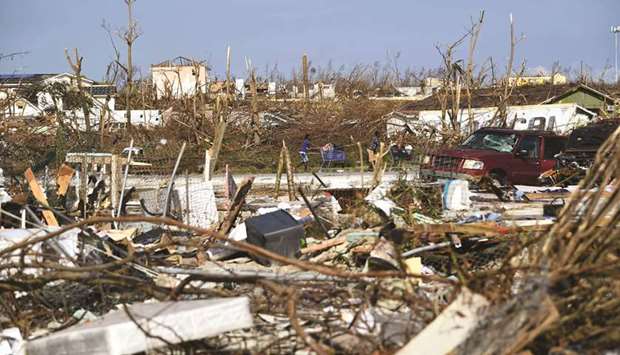Bahamians scrambled to escape the islands hardest-hit by Dorian, which has killed at least 43 people, while the storm wreaked “havoc” farther north in Canada after making landfall near Halifax late on Saturday.
Even as some Bahamians began to reunite with their loved ones, the death toll — 35 so far in the Abaco Islands and eight in Grand Bahama — was likely to climb “significantly,” according to Prime Minister Hubert Minnis.
A loosely coordinated armada of passenger planes, helicopters and both private and government boats and ships — including redirected cruise liners — converged in the Bahamas on the horribly battered Abacos to help with evacuations, both to Nassau and to the US mainland.
Evacuees began flowing out of the region as a cruise ship carrying 1,400 people docked Saturday in Riviera Beach, Florida, CNN reported. All had documents to enter the United States.
The Coast Guard said all Bahamian ports had now reopened and it had deployed nine cutters to the islands. Six of its MH-60 Jayhawk helicopters had so far rescued 290 people.
And more than 260 Abacos residents arrived on Friday in Nassau on a government-chartered ferry, part of the first wave of people to be evacuated off the archipelago’s most decimated islands.
Thousands of miles north, Dorian, now classified as a post-tropical cyclone, was “wreaking havoc over the Canadian Maritimes,” the US-based National Hurricane Center said.
More than 500,000 power outages were reported according to the Canadian Hurricane Centre, which said the problem extended across the Maritimes, a three-province region in east Canada comprising Nova Scotia, New Brunswick and Prince Edward Island.
Dorina made landfall south of the port city of Halifax but was back out at sea early yesterday after tracking across Nova Scotia. Television images showed a downpour and howling winds in the empty streets of downtown Halifax where a crane collapsed onto a semi-constructed building and a roof was torn off another apartment.
There were “countless reports of downed or uprooted trees” and storm surge flooding in several Atlantic coastal areas including Halifax Harbour, the Canadian Hurricane Centre said.
No serious injuries or fatalities have been reported, CTV said.
Bahamas residents said conditions on the devastated islands were brutal and that the smell of unrecovered bodies, along with mounting piles of garbage, was oppressive and unsanitary.
Hundreds or even thousands of people were still missing, officials said, as search-and-rescue teams continued their grim retrievals.
Meanwhile, Minnis said Nassau “cannot possibly accommodate” all the Abaco victims. For now, he said, supplies of food and water were adequate, although several witnesses from Abaco contested that.
While the prime minister called the loss of life “catastrophic and devastating,” Health Minister Duane Sands said the final death toll “will be staggering.”
UN relief officials said more than 70,000 people on Grand Bahama and Abaco were in need of assistance. The WFP was sending food and supplies. A UN World Food Program team estimated that 90% of buildings in Marsh Harbour were damaged.
The US Coast Guard, Britain’s Royal Navy and private organizations have been helping evacuate island residents to Nassau, hampered by damaged piers and airport runways.
Chamika Durosier was waiting Saturday at the Abaco airport. The island, she said, was unsafe. “The home that we were in fell on us,” she said. “We had to crawl — got out crawling. By the grace of God we are alive.”
She described the increasingly desperate plight of those left behind. “People have no food. People have no water, and it’s not right. They should have been gone.
“Dead bodies are still around and it’s not sanitary.”
Dorian, a monstrous Category 5 hurricane when it raked through the Bahamas, was buffeting eastern Canada over the weekend with winds equivalent to those of a Category 1 hurricane.
Although it was packing hurricane-force maximum sustained winds of 130kph, Dorian was at sea heading across the Gulf of St Lawrence, the Canadian Hurricane Centre said its advisory at 0900 GMT yesterday.
Storm surges were causing widespread flooding and 7.5cm to 12.5cm of rain were reported over Nova Scotia, southeastern New Brunswick and western Prince Edward Island.
Prime Minister Justin Trudeau was briefed on the storm.
“The safety of Canadians is our number one priority and we’re ready to help Atlantic Canada through this storm,” he said on Twitter.
Canada was sending up to 700 troops to Atlantic provinces to assist “with the restoration of power services, clearing main roadways and evacuating residents in flooded or severely damaged areas,” Public Safety Minister Ralph Goodale said in a statement.
Defense Minister Harjit Sajjan assured Canadians on Twitter that “our Armed Forces will be there to aid you in this challenging time. Stay safe and listen to your local first responders.”
Earlier, Dorian brought flooding and power outages but no major damage to the coastal Carolinas and Virginia in the United States.

Locals push shopping carts past debris in the Mudd neighbourhood of Marsh Harbor, Great Abaco, on Saturday in the aftermath of Hurricane Dorian.
